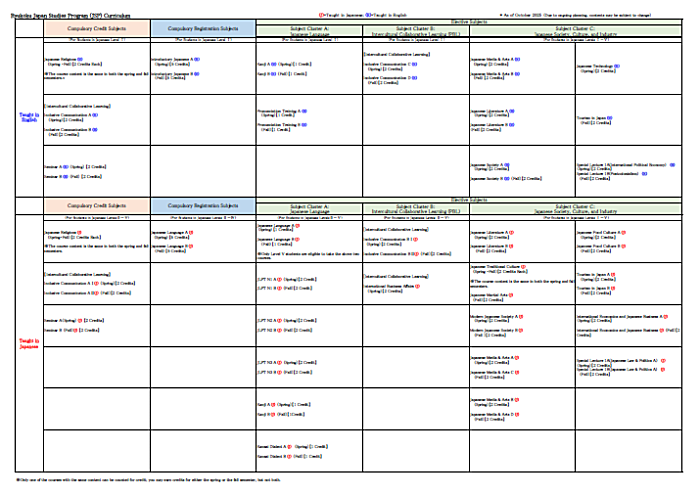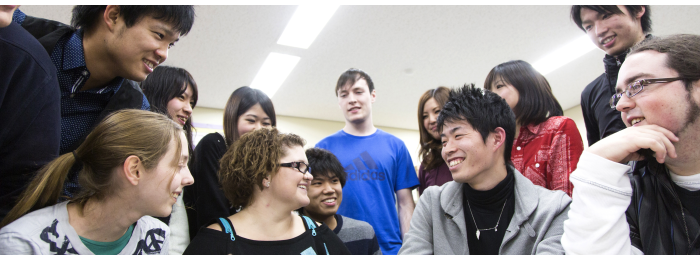- Information about the Ryukoku Japan Studies Program (JSP), scheduled to launch in April 2026, is provided below. Please note that some content is still being developed and is subject to change. This page will be updated periodically.
The Ryukoku Japan Studies Program (JSP) is designed for inbound Exchange Students to study the Japanese language as well as Japanese society and culture, with a unique focus on the concept of “Magokoro (Sincerity).”
Kyoto, where Ryukoku University is located, has long flourished as a cultural center of Japan throughout history. In this location, where tradition and modernity coexist, students can explore Japan from a variety of perspectives. Ryukoku University is the oldest university in Japan and is internationally recognized for its excellence in Buddhist Studies. One of JSP’s key themes is the concept of “Magokoro”, a value rooted in Buddhist philosophy. “Magokoro” refers to a sincere heart which focuses on self-reflection, care for others, and altruistic activities.
Another major feature of JSP is experiential learning – field trips to historical and cultural sites in Kyoto and international collaborative Project-Based Learning (PBL), through which participants will address shared challenges with peers from Ryukoku University throughout the program.
Program Overview
- Gain an understanding of the traditional Japanese spirit which has been nurtured for over a thousand years in the ancient capital, as well as spiritual bonds rooted in Buddhism.
- Learn about the position and characteristics of Buddhism, in comparison with other world religions.
- Deepen connections with Ryukoku University students and local residents, and acquire perspectives and methods for intercultural understanding.
- Understand the concept of “Magokoro” and, through its embodiment, contribute to social development and international cooperation.

Program Curriculum
- ●The program curriculum consists of subjects in the following categories: Compulsory Credit Subjects, Compulsory Registration Subjects (credits not required for JSP program completion), and Elective Subjects.
- ●Elective Subjects are divided into three groups.
- ●There are subject offerings in both Japanese and English, allowing students to select classes according to their individual needs and language proficiency.
- ●Japanese language subjects are organized into classes based on proficiency levels.
| Subject Cluster A | Japanese Language Studies | A cluster of subjects focused on Japanese language learning. Offers diverse opportunities to study Japanese, ranging from JLPT preparation to linguistic approaches. |
| Subject Cluster B | International Collaborative PBL | A subject cluster in which international students and Ryukoku University’s domestic students learn together through small-group, Project-Based Learning (PBL) formats. |
| Subject Cluster C | Japanese Society, Culture, and Industry | This subject cluster focuses on Japanese society, culture, economy, and business. It offers a wide range of courses, from casual classes aimed at experience and interaction to more specialized academic subjects. |
Curriculum Chart (as of October 2025)

Program Completion Requirements
For program completion, students must earn at least 15 JSP credits if enrolled for one semester, or at least 30 JSP credits if enrolled for two semesters. A "JSP Certificate of Completion" will be issued to those who are enrolled for at least one semester and have met the requirements above.
Half Year (One Semester) Curriculum Model
◆Model①◆
For students with no prior knowledge of the Japanese language
who wish to take subjects offered in English

| Compulsory Credit Subjects (6 Credits) |
Japanese Religions (E)【2 Credits】 Inclusive Communication A (E)【2 Credits】 Seminar A (E)【2 Credits】 |
|---|---|
| Compulsory Registration Subjects (5 Credits) |
Introductory Japanese A (E)【5 Credits】 |
| Elective Subjects (8 Credits) |
<Subject Cluster A> Kanji (E)【1 Credit】 Pronunciation Training A (E)【1 Credit】 <Subject Cluster C> Japanese Media & Arts A (E)【2 Credits】 Japanese Society A (E)【2 Credits】 Japanese Technology (E)【2 Credits】 |
◆Model②◆
For students aiming to work in Japan who would like to strengthen their Japanese language skills and develop an understanding of Japanese business practices

| Required classes (6 credits) |
Japanese Religions (J)【2 Credits】 Inclusive Communication AⅠ (J)【2 Credits】 Seminar A (J)【2 Credits】 |
|---|---|
| Compulsory Registration Subjects (5 Credits) |
Japanese Language A (J)【5 Credits】 |
| Elective Subjects (9 Credits) |
<Subject Cluster A> JLPT N1 A (J)【1 Credit】 JLPT N2 A (J)【1 Credit】 Kansai Dialect A (J)【1 Credit】 <Subject Cluster B> International Business Affairs (J)【2 Credits】 <Subject Cluster C> Modern Japanese Society A (J)【2 Credits】 International Economics and Japanese Business A (J)【2 Credits】 |
>>Students at Class Level JSP-V may take the required course “Japanese” as an elective.
◆Model③◆
For students who wish to focus on cultural experiences and collaborative learning with Ryukoku University Students

| Compulsory Credit Subjects (6 Credits) |
Japanese Religions (J) 【2 Credits】 Inclusive Communication AⅠ (J)【2 Credits】 Seminar A (J)【2 Credits】 |
|---|---|
| Compulsory Registration Subjects (5 Credits) |
Japanese Language A (J)【5 Credits】 |
| Elective Subjects (8 Credits) |
<Subject Cluster B> Inclusive Communication BⅠ (J)【2 Credits】 International Business Affairs (J)【2 Credits】 <Subject Cluster C> Japanese Traditional Culture (J)【2 Credits】 Japanese Food Culture A (J)【2 Credits】 |
>>Students at Class Level JSP-V may take the required course “Japanese” as an elective.
Japanese Language Classes
Japanese language classes are aligned with CEFR (Common European Framework of Reference for Languages), and divided into five levels based on CEFR proficiency levels. Participation is mainly determined by a Placement Test. However, instruction for the JSP-Ⅰ class is provided in English, so students with no prior study of the Japanese language can participate easily.
| Class Level | CEFR Level | Language of Instruction |
|---|---|---|
| JSP-Ⅰ |
A1 and Under | English |
| JSP-Ⅱ | A2.1 | Japanese |
| JSP-Ⅲ | A2.2 | Japanese |
| JSP-Ⅳ | B1.1 | Japanese |
| JSP-V | B1.2 and Above | Japanese |
Enrollment in Undergraduate Major Subjects, etc.
Students in Level I–III may be eligible to register for major courses or general education courses offered in English in undergraduate or graduate schools.
Students in Level IV–V may be eligible to register for major courses or general education courses offered in undergraduate or graduate schools.
If students earn credits from major courses or general education courses offered in undergraduate or graduate schools, those credits will be counted as elective courses toward the JSP completion requirements.
The Value of Studying in Kyoto
― 10 Reasons to Choose Kyoto ―
Kyoto, home to Ryukoku University, offers an exceptional learning environment for International Students, thanks to its cultural charm, rich history, and diverse initiatives. The “Study Kyoto Network” provides information on support for International Students, including study opportunities and various support system available in Kyoto. Please refer to the following link for more details.